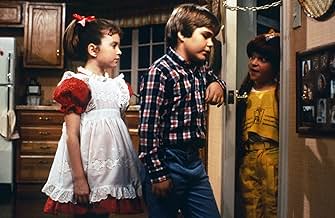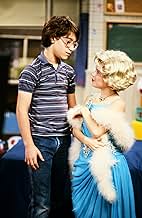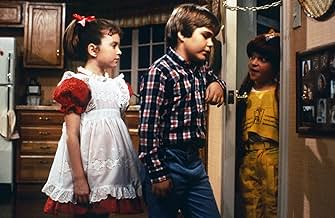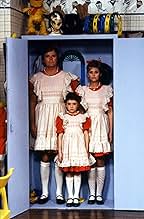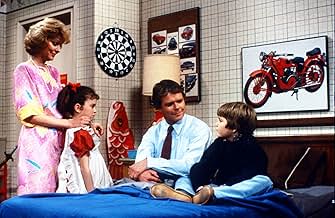Les aventures loufoques d'une famille de banlieue, de ses voisins et d'un robot innovant conçu pour ressembler à un enfant humain.Les aventures loufoques d'une famille de banlieue, de ses voisins et d'un robot innovant conçu pour ressembler à un enfant humain.Les aventures loufoques d'une famille de banlieue, de ses voisins et d'un robot innovant conçu pour ressembler à un enfant humain.
- Récompenses
- 2 victoires et 13 nominations au total
Parcourir les épisodes
Histoire
Le saviez-vous
- AnecdotesEdie McClurg left the show during the third season for a full-time role on Valerie (1986). During the last two seasons her character was referred to off-camera, and largely replaced by Brandon's sister Ida Mae.
- GaffesDespite being "made of plastic, microchips here and there", the robot and her costume grew from season to season to accommodate the actress. However, in the season 4 episode "School Monitor", there was an explanation given by the father, who put in a special chip that enabled her to grow to avoid suspicion from friends and neighbors why she never grew and remained the same age.
- Citations
[repeated line]
Mrs. Brindle: No na na no no no!
- ConnexionsFeatured in I Love the '80s: 1985 (2002)
Commentaire à la une
What is the nature of the self? What does it truly mean to be human? Can man ever transcend the limitations of his physical being and come to understand what is meant by the words "ultimate reality"? Does God exist? Are we alone in the universe?
Throughout the course of human history, great minds have attempted to tackle such questions. Minds of men like Plato, Aristotle, and Socrates. Minds of men like Sartre, Nietzsche, and Freud. While few have had the courage to address the implications of these central existential dilemmas, even fewer have been able to offer any worthwhile insight on such matters, or do any more than merely scratch the surface with repetitive supposition and conjecture.
How rare it is when a work of art can at once synthesize, and then surpass the work of all that has come before it.
"Small Wonder" is just such an achievement.
If the Sistine Chapel were a sitcom, it would be "Small Wonder". If William Shakespeare had been writing sitcoms in the 1980s, he would have written "Small Wonder". If Leonardo da Vinci were alive today he would have painted the Mona Lisa with a pony tail and a red and white dress, and simply called his subject 'Vicki'.
The husband, the father, the inventor. All one man. Ted Lawson. In his workshop he creates a robot daughter who sleeps in his son's closet. Rather than cash in on his invention, which could have totally revolutionized the communications industry, the Lawsons vow to keep Vicki a secret, for some reason.
That one suburban schlub of a man can create life --does create life, in his basement, signifies, validates the presence of the divine in the banal. Man is divine, as he is created in God's image. Yet man can create man. Therefore...
Mrs. Poole, the neighbor, or was it Mrs. Brindle? I'm getting my shows confused I think. Anyway, Mrs. Brindle the neighbor who sits by idly, and had born of her womb a daughter with fiery red hair and marks of the devil all about her skin. Is Harriet Satan? Is Vicki Christ?
A theological treatment of "Small Wonder", in itself, would likely fill multiple volumes. I'm surprised more hasn't been written about the show.
In addition to such a captivating and intellectually challenging premise, the show also featured some of the most remarkable special effects ever to be put on film. Before or since. When Vicki would lift the couch, for instance, it was almost impossible to see the thick blue line around the couch's edges. Special effects which later influenced the likes of "Jurassic Park" and "Independence Day", no doubt.
I could go on and on about this show, but I won't. If you haven't seen every episode at least five times, consider yourself incomplete. I would be both enticed and excited by the proposal of opening up a school, (an Academy, if you will) where the curriculum consisted solely of screenings and discussions of episodes of "Small Wonder".
Throughout the course of human history, great minds have attempted to tackle such questions. Minds of men like Plato, Aristotle, and Socrates. Minds of men like Sartre, Nietzsche, and Freud. While few have had the courage to address the implications of these central existential dilemmas, even fewer have been able to offer any worthwhile insight on such matters, or do any more than merely scratch the surface with repetitive supposition and conjecture.
How rare it is when a work of art can at once synthesize, and then surpass the work of all that has come before it.
"Small Wonder" is just such an achievement.
If the Sistine Chapel were a sitcom, it would be "Small Wonder". If William Shakespeare had been writing sitcoms in the 1980s, he would have written "Small Wonder". If Leonardo da Vinci were alive today he would have painted the Mona Lisa with a pony tail and a red and white dress, and simply called his subject 'Vicki'.
The husband, the father, the inventor. All one man. Ted Lawson. In his workshop he creates a robot daughter who sleeps in his son's closet. Rather than cash in on his invention, which could have totally revolutionized the communications industry, the Lawsons vow to keep Vicki a secret, for some reason.
That one suburban schlub of a man can create life --does create life, in his basement, signifies, validates the presence of the divine in the banal. Man is divine, as he is created in God's image. Yet man can create man. Therefore...
Mrs. Poole, the neighbor, or was it Mrs. Brindle? I'm getting my shows confused I think. Anyway, Mrs. Brindle the neighbor who sits by idly, and had born of her womb a daughter with fiery red hair and marks of the devil all about her skin. Is Harriet Satan? Is Vicki Christ?
A theological treatment of "Small Wonder", in itself, would likely fill multiple volumes. I'm surprised more hasn't been written about the show.
In addition to such a captivating and intellectually challenging premise, the show also featured some of the most remarkable special effects ever to be put on film. Before or since. When Vicki would lift the couch, for instance, it was almost impossible to see the thick blue line around the couch's edges. Special effects which later influenced the likes of "Jurassic Park" and "Independence Day", no doubt.
I could go on and on about this show, but I won't. If you haven't seen every episode at least five times, consider yourself incomplete. I would be both enticed and excited by the proposal of opening up a school, (an Academy, if you will) where the curriculum consisted solely of screenings and discussions of episodes of "Small Wonder".
- kinskimonkey
- 26 sept. 2002
- Permalien
Meilleurs choix
Connectez-vous pour évaluer et suivre la liste de favoris afin de recevoir des recommandations personnalisées
- How many seasons does Small Wonder have?Alimenté par Alexa
Détails
- Date de sortie
- Pays d’origine
- Langue
- Aussi connu sous le nom de
- Petite merveille
- Lieux de tournage
- Sociétés de production
- Voir plus de crédits d'entreprise sur IMDbPro
- Durée30 minutes
- Couleur
Contribuer à cette page
Suggérer une modification ou ajouter du contenu manquant



